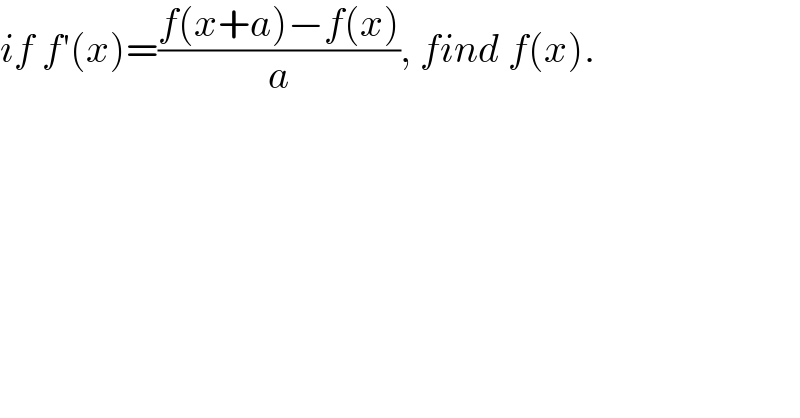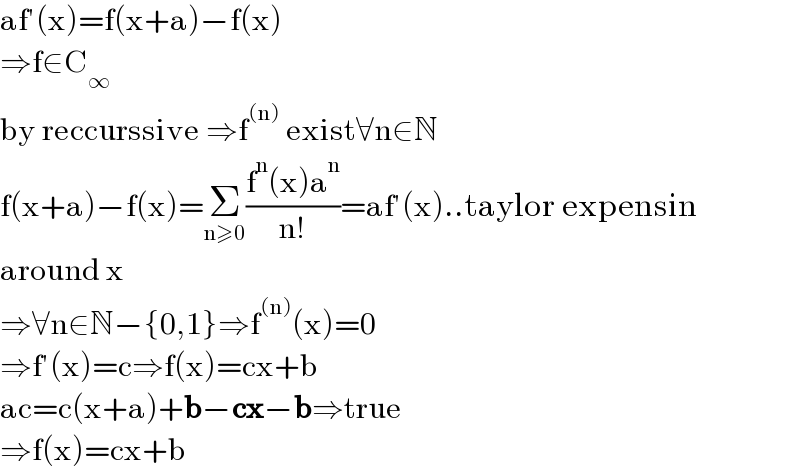
Question Number 195971 by mr W last updated on 14/Aug/23

$${if}\:{f}'\left({x}\right)=\frac{{f}\left({x}+{a}\right)−{f}\left({x}\right)}{{a}},\:{find}\:{f}\left({x}\right). \\ $$
Answered by jabarsing last updated on 14/Aug/23

$${hello}\:{mr}.{w}\:{dear} \\ $$$${f}\left({x}\right)={C}\:\:\:\:\left({conestant}\:{function}\right)=? \\ $$$${is}\:{true}? \\ $$
Commented by mr W last updated on 14/Aug/23

$${generally}\:{it}\:{can}\:{be}\:{any}\:{straight}\:{line}. \\ $$
Commented by jabarsing last updated on 14/Aug/23

$${thank}\:{you} \\ $$
Answered by MM42 last updated on 14/Aug/23

$${f}\left({x}\right)={ax}+{b} \\ $$
Commented by mr W last updated on 14/Aug/23
��
Answered by witcher3 last updated on 14/Aug/23

$$\mathrm{af}'\left(\mathrm{x}\right)=\mathrm{f}\left(\mathrm{x}+\mathrm{a}\right)−\mathrm{f}\left(\mathrm{x}\right) \\ $$$$\Rightarrow\mathrm{f}\in\mathrm{C}_{\infty} \\ $$$$\mathrm{by}\:\mathrm{reccurssive}\:\Rightarrow\mathrm{f}^{\left(\mathrm{n}\right)} \:\mathrm{exist}\forall\mathrm{n}\in\mathbb{N} \\ $$$$\mathrm{f}\left(\mathrm{x}+\mathrm{a}\right)−\mathrm{f}\left(\mathrm{x}\right)=\underset{\mathrm{n}\geqslant\mathrm{0}} {\sum}\frac{\mathrm{f}^{\mathrm{n}} \left(\mathrm{x}\right)\mathrm{a}^{\mathrm{n}} }{\mathrm{n}!}=\mathrm{af}'\left(\mathrm{x}\right)..\mathrm{taylor}\:\mathrm{expensin} \\ $$$$\mathrm{around}\:\mathrm{x}\: \\ $$$$\Rightarrow\forall\mathrm{n}\in\mathbb{N}−\left\{\mathrm{0},\mathrm{1}\right\}\Rightarrow\mathrm{f}^{\left(\mathrm{n}\right)} \left(\mathrm{x}\right)=\mathrm{0} \\ $$$$\Rightarrow\mathrm{f}'\left(\mathrm{x}\right)=\mathrm{c}\Rightarrow\mathrm{f}\left(\mathrm{x}\right)=\mathrm{cx}+\mathrm{b} \\ $$$$\mathrm{ac}=\mathrm{c}\left(\mathrm{x}+\mathrm{a}\right)+\boldsymbol{\mathrm{b}}−\boldsymbol{\mathrm{cx}}−\boldsymbol{\mathrm{b}}\Rightarrow\mathrm{true} \\ $$$$\Rightarrow\mathrm{f}\left(\mathrm{x}\right)=\mathrm{cx}+\mathrm{b} \\ $$
Commented by mr W last updated on 14/Aug/23
��
